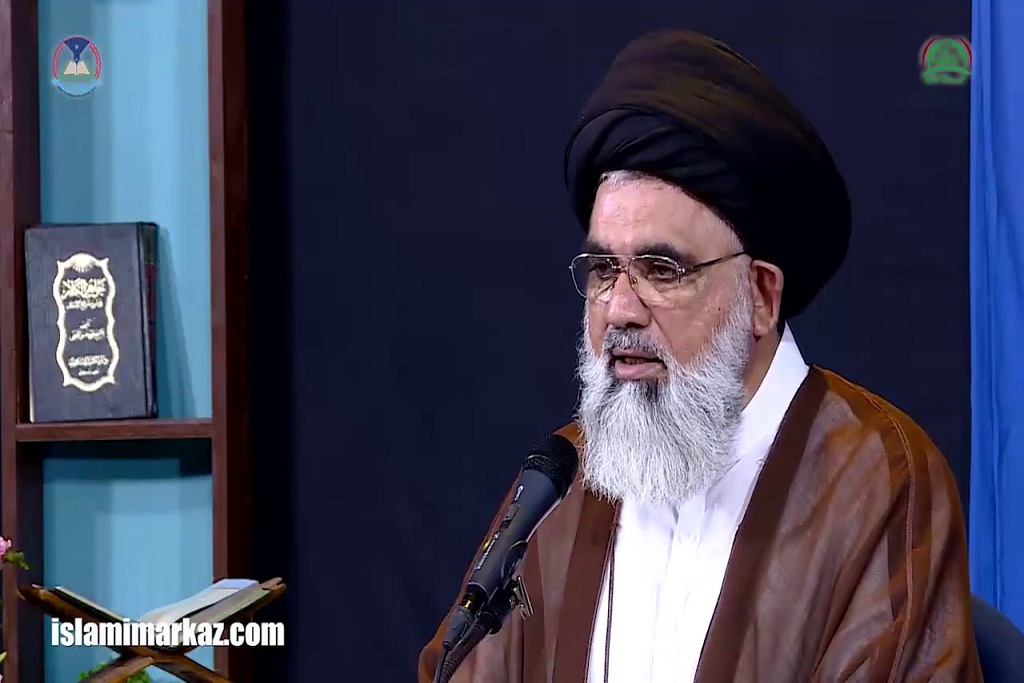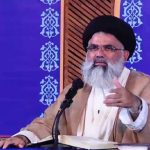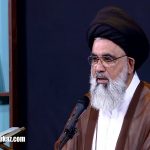Hujjatul Islam Ustad Syed Jawad Naqvi
(Principal Jamia Orwatul Wuthqa – Lahore)
Delivered at: Masjid Baitul ul Ateeq
Lahore – Pakistan
Friday Sermon – 10th January 2025
Sermon 1: Allah will punish those who only touch the Quran but their lives are not Quranic
Sermon 2: Israel publishes a three thousand years old map of Jewish Sovereignty
In an environment dominated by Taghoot, we are being nurtured in a way that also influences our Taqwa. We have all absorbed the mindsets, attitudes, trends, and behaviors associated with Taghoot, and because everyone around us is similar, we often fail to notice the impact. If we were to observe the characteristics of the Muttaqeen, we would have a standard to evaluate our own limits, much like the presence of Imam Ali (a) in society. Many believe that we are sincere, faithful, and of high character simply because we exist within a corrupt environment. However, Allah has provided a measure for Taqwa in the Quran that we must strive to embody.
In this context, Allah (swt) mentions in Surah Al-An’am, verse 155:
وَهَٰذَا كِتَابٌ أَنْزَلْنَاهُ مُبَارَكٌ فَاتَّبِعُوهُ وَاتَّقُوا لَعَلَّكُمْ تُرْحَمُونَ {155}
And this is a Book We have revealed, blessed; therefore follow it and guard (against evil) that mercy may be shown to you.
This book has been revealed to you, and it is Mubarak. You need to follow it and cultivate Taqwa. The instruction here is to practice Itteba, which means to follow, rather than merely reciting (Tilawat). Itteba implies that you should hold tightly to the signs of Allah without any gaps. Itteba also denotes following something that is in motion, meaning you adapt to the same movement as the object you are following. In simple terms, it’s like saying, “I am going this way; just follow where I am going.”
The Quran is not just a printed book; it is a constitution that carries the manifesto for every aspect of individual and social life. The Quran is intended to organize and discipline our lives, and we must practice Itteba, i.e., follow the Quran. The system of the Quran is dynamic, and humans must align themselves with that movement. The society should not be stagnant according to the teachings of the Quran; instead, it should remain active and in motion. By doing so, you can attain Taqwa, but the next verse elaborates on the subjective reference.
أَنْ تَقُولُوا إِنَّمَا أُنْزِلَ الْكِتَابُ عَلَىٰ طَائِفَتَيْنِ مِنْ قَبْلِنَا وَإِنْ كُنَّا عَنْ دِرَاسَتِهِمْ لَغَافِلِينَ {156}
Lest you say that the Book was only revealed to two parties before us and We were truly unaware of what they read.
أَوْ تَقُولُوا لَوْ أَنَّا أُنْزِلَ عَلَيْنَا الْكِتَابُ لَكُنَّا أَهْدَىٰ مِنْهُمْ ۚ فَقَدْ جَاءَكُمْ بَيِّنَةٌ مِنْ رَبِّكُمْ وَهُدًى وَرَحْمَةٌ ۚ فَمَنْ أَظْلَمُ مِمَّنْ كَذَّبَ بِآيَاتِ اللَّهِ وَصَدَفَ عَنْهَا ۗ سَنَجْزِي الَّذِينَ يَصْدِفُونَ عَنْ آيَاتِنَا سُوءَ الْعَذَابِ بِمَا كَانُوا يَصْدِفُونَ {157}
Or lest you should say: If the Book had been revealed to us, we would certainly have been better guided than they, so indeed there has come to you clear proof from your Lord, and guidance and mercy. Who then is more unjust than he who rejects Allah’s communications and turns away from them? We will reward those who turn away from Our communications with an evil chastisement because they turned away.
People argue that we are not aware of the books revealed before the Quran. This book, the Quran, has been revealed to address that argument. The verse states that they claim if a book had been revealed to us, we would be more guided than them. It is similar to how some people in Pakistan say that if an Islamic revolution had occurred there, we would have thrived. These revolutionaries were merely opportunists who became revolutionary for personal gain, and now they are preaching and following democracy.
The verse further states that the greatest oppressor is the one who denies the book after it has been presented to them. Allah will punish those who turn away. The term “Sadaf” is used for those who turn away from the book of Allah, and it appears three times in the same verse. We commonly understand “Sadaf” as the shell in which oysters live, where pearls can also be found. However, this is not the technical meaning of “Sadaf.” It is used in opposition to Itteba, which expands the term further. “Sadaf” signifies two things: living apart from the center and meeting at the edges. For example, the oyster shell connects at the edges, but the center is hollow. Similarly, in camels, the hooves are close together, while the thighs are apart. They are not entirely separate; they are connected at some point, but other areas remain distant.
In Arabic, an accident is referred to as “Tasaduf,” which implies that the cars were driving with a gap but eventually collided or connected at some point. When two people who did not intend to meet happen to meet in a gathering, it is called “Musadafa.” They do not reduce the distance between them, as they merely exchange greetings. This illustrates the meaning of “Sadaf.”
“Sadaf” means being connected to the Quran, but the relationship is such that only the edges of your life overlap with the edges of the Quran, while the core subjects and teachings of the Quran remain distant. This indicates that sometimes you may touch the Quran or recite it, but you only engage with its superficial aspects. The verse states that those who deny the teachings of the Quran are the greatest oppressors. They engage in Tasdeef regarding the Quran—they are connected only at the edges while denying its essence. When lives are distorted, it resembles a shell with bulging insides and protruding edges. Crooked things do not align perfectly. When there is deviation in a person’s life, the edges may touch the Quran, but the entirety of their life remains disconnected, and they are unwilling to change.
The Quran is our Imam, and we should follow wherever it leads, as emphasized by Imam Ali (a.s). In Arabic terminology, an Imam is a string known as a plumb bob or level meter, used by masons to determine if a wall is straight or crooked. The Imam serves as a standard to ensure that human life is upright. An Imam is a role model and guide essential for maintaining the structure of the Ummah.
Why is there no unity in the Ummah today? Do the Shias themselves accept each other? Do they visit each other’s mosques? Each group has established its own systems. Their edges may meet, but the rest of the structure does not align. This disunity stems from being crooked and lacking the system of Imamat. How can the Ummah remain straight without an Imam? An Imam is not merely a mayor managing a city’s administrative affairs; rather, an Imam is one who develops an Ummah. Sects arise when crookedness takes hold of people and groups. We should not engage in “Tasdeef” of the Quran, which means our lives may touch the Quran superficially, but everything else is distant.
We must assess our ethics and morals and see how harmonized they are with the teachings of the Quran. How much of the Quranic ethics and morals exist in our lives? When disputes arise between spouses, in social affairs, or in relationships with younger individuals, how we manage these issues can be evaluated against the Quran. If we do not align ourselves with the Quran, Allah warns that He will inflict severe punishment on those who deny the Quran and those who practice “Tasdeef.” These individuals merely touch the Quran at the edges, while the core of their lives remains disconnected.
Living peacefully and contentedly in a Taghoot society is not trivial; it involves a silence that spans generations. Accepting the governance of Taghoot leads to a separation from the Quran. We have consented and even agreed to this separation from the Quran. The majority seem satisfied and content with their lives. If they have food in their homes, they consider themselves fine. Those who lack food are viewed as being under punishment. We have distanced ourselves from the Quran because we feel we have everything we need, so why should we seek anything from Allah? This mindset has been cultivated by Taghoot within us. May Allah grant us the opportunity to attain constitutional Taqwa.
SERMON 2
After creation, man requires Rizq (provision) for survival and sustenance. Alongside the provisions provided by Allah, a system of guidance has been established, known as religion, which directs man toward the purpose of creation. Without guidance, the assets of life are lost, and this guidance is preserved by Taqwa. Without Taqwa, all of man’s abilities diminish, and he no longer remains truly human. If things are not preserved, they are either lost or become rusted and perished. Allah has granted us a significant opportunity in the form of Jamea, yet we fail to protect it. Recently, we captured on camera a seminary student attempting to break a CCTV camera. Allah has granted this opportunity to those who created it, and now it is our responsibility to safeguard it. This protection can only occur when we first preserve our humanity. Elders have always advised the younger generation to become truly human. We also question whether we are acting in a manner befitting humanity. If a theology student understands his status, he can truly become a student. Therefore, we must recognize our humanity in order to preserve it.
Today, we observe that our generation lacks humanity, despite people worshiping Allah. Every sect and lineage has lost its sense of humanity, as evidenced by the situation in Gaza. Imam Ali (a) once remarked that people resemble humans but lack true manliness within them. Scholars, politicians, and rulers have lost their humanity. Israel has even published a map from three thousand years ago, showing the extent of their historical territories, and they seek to regain control over those lands. This boldness is evident in the presence of Islamic nations such as Jordan, Egypt, and Saudi Arabia. How did they gain this courage? Meanwhile, thirty-five Muslim countries are subservient to Bin Salman. Israel will fulfill its ambitions and claims as long as such rulers remain in power among Muslims. Jordan will hand over the key without a battle. They have destroyed the lands of resistance in Syria through Takfirist elements. Recently, a new President, Aun Joseph, a Christian, has been appointed according to their policies, with votes from all groups. He was previously an army general, anti-Hezbollah, and a supporter of America, France, and Israel. His main objective is to disarm Hezbollah, a goal that many have desired for the past forty years, but Iran has consistently opposed it. Syria previously defended Lebanon, but after the death of Rafiq Hariri, they withdrew their support. This is a significant step toward protecting Israel.
This new president did not receive votes from Hezbollah and Shia representatives in the first round. In the second round, American and French representatives exerted pressure to ensure his appointment as President. The situation with Hamas is similar, as it has become besieged, and Hezbollah is now facing similar circumstances. For the first time in forty years, Iranian diplomats were searched at Beirut airport, creating the impression that Iran has no influence in Lebanon. This change mirrors what happened in Syria.
The third development in the region pertains to Iraq. The Iraqi President Sodani recently visited Iran for one day. Such brief visits typically do not involve agreements; they are often intended to deliver warnings or enticements. He met with the Supreme Leader and the Iranian President without the presence of other ministry officials. The message he conveyed was not covered by any media, but he undoubtedly came as a representative of America and Bin Salman, either to issue a warning or to offer enticing benefits. The changes that occur will reveal the nature of the message he delivered. The Iraqi President was advised by the Supreme Leader not to dismantle Hashd al-Shabi. In Iran, the current President Pazeshkian does not support Resistance; he seeks to lift sanctions and resolve internal issues based on Rafsanjani’s model.
The Pakistani establishment has played no role in the global crisis and focuses solely on its own country, and we see how beautifully Pakistan is being managed. The current Iranian government leans in this direction, but the decision-making power lies with the Leader, who commands the Resistance. He has repeatedly stated that the resistance front will not be dismantled and will become more organized, although the rest of the Iranian cabinet does not favor this stance. Israel has published a map from three thousand years ago, claiming Jordan, Lebanon, Egypt, Syria, and Saudi Arabia as its territory. This audacity stems from the treachery of Arab rulers and Turkey. They have all contributed to this opportunity for Israel, which can happen again. The Resistance will continue, but tactics will need to be adjusted. Even if the Iraqi government dissolves the title of Hashd al-Shabi, their resistance will not end. Killing Nasrallah or Haniyeh will not extinguish the resistance. Hamas recently killed seven Israeli soldiers, even under these circumstances, which is nothing short of miraculous. These traitors are preoccupied with their schemes, but Allah’s strategy will ultimately prevail.







